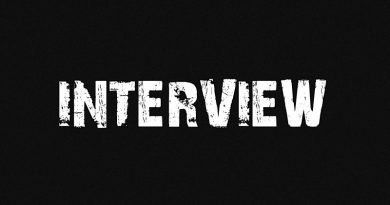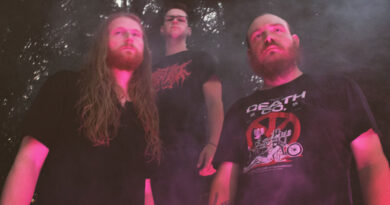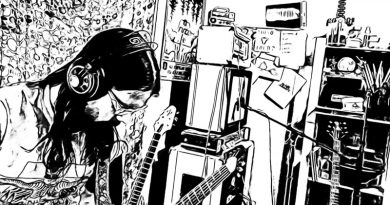In Search Of Tone: Brian Cook Of Russian Circles & SUMAC
I first heard of Russian Circles a few years back and although I wasn’t a fan of instrumental music, they quickly changed my mind. Fast forward a few years and I learned of SUMAC and their fantastic intensity. Brian Cook playing bass in both bands came as a surprise but really shouldn’t because the level of musicianship in both bands requires one incredible musician and he fits that bill.
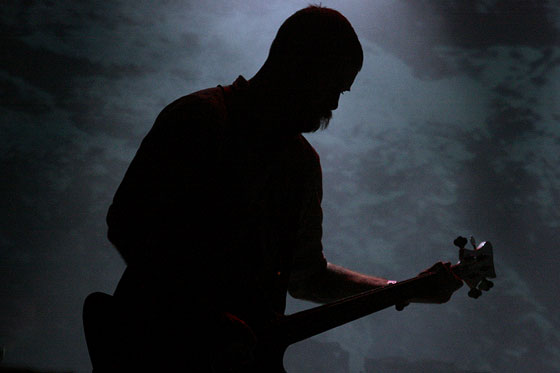
Brian was kind enough to take over an hour to discuss all things music and we went off on a few tangents along the way. He was a pleasure to talk to and taught me so much. I also learned he’s a part of These Arms Are Snakes and recently released a solo acoustic record. More music from Brian Cook! What could be better!
I know you enjoy Rig Rundowns a lot so we’ll spend a bit of extra time on it. Just kidding, but could you talk a little about what gear you’re using both for bass and guitar?
Really the only bass I use for writing, recording and performing is an Electrical Guitar Company, I think it’s a Series 2, I hope I got that right that’s why I don’t like rig rundowns. I forget my own gear [laughs]. That’s one of the stock options at Electrical Guitar Company. It’s an aluminum neck instrument like all their guitars. I picked one up because we’ve done so much flying and international travel. I used to travel with these old vintage Gibson guitars and I would think ‘I hope you make it’ [laughs], I’d always hope to see the guitar show up in one piece on the other side of the conveyor belt [laughs]. So, I love those bass guitars too much to keep traveling with them.
With the aluminum neck you could just check in with it in a potato sack and it would show up with no issues and they just sound cool. I do think it’s also made me a better bass player because it’s so much brighter and more articulate. I feel like it puts my playing under a microscope and made me realize I’m kind of sloppy as I like to play behind the beat. I try to be a bit more in the pocket with these things so it’s a good instrument in that capacity. I have other bass guitars that I enjoy playing at home, but as far as recording and performing, it’s the Electrical Guitar Company all the way.
the only bass I use for writing, recording and performing is an Electrical Guitar Company…
For my Baritone Guitar, I have a custom First Act that I had built for me when they still had a custom shop back in the 2000s and I love that thing. I’m staring at it right now actually, but it’s always the same thing where it’s been on tour for thirteen years and now I’m almost too attached to it and I hate the idea of taking it on the road and disappearing, or getting smashed or miss handled. My friend Sasha at Dunable Guitars made me a new Baritone and it rules. I fucking love it and I play that more than anything else in the house. It hasn’t been played live yet, although it’s been on some recordings that I have coming up. Also, the fact that Sasha is still in operation, as opposed to First Act custom shop, makes me a little more comfortable traveling because I know if something happens to it, I can always ship it over to Sasha and have him save it. So that’s now my primary Baritone.
Amp wise. I have a Verellen Meatsmoke which was made about ten years ago by my friend Ben Verellen, who plays in excellent band Helms Alee, and it rules. I got a lot of use out of that. I also use a couple of Darkglass amps. I primarily use an Alpha Omega 900 that came out not too long ago. Darkglass has been really awesome and they’re kind of taking off now, they make really solid well-built practical stuff. I’m about to switch over to their cabinets as we’re working on that now.
I use the Moog Taurus 3 for keyboards. It’s like a big organ pedal I play and they’re a lot of fun. Pedal wise, it kind of switches up a little bit. It’s frustrating, Mike [Sullivan] and I talked about it a lot because it’s tricky to switch up pedals. So much of the sonic color comes from whatever specific petals were using. There’s always the temptation to further refine or find an even better option, so even if you’re really happy with your distortion sound, you try another pedal and you think that’s the sound I’m looking for.
I also use a couple of Darkglass amps. I primarily use an Alpha Omega 900 that came out not too long ago…
It’s exciting especially, if you’re trying new material, but if you have to go back and play a song that’s ten years old and written on a different pedal configuration, then all of a sudden you realize it doesn’t sound the same because I wrote these riffs around the idiosyncrasies, or a particular sound quality of a certain pedal. It doesn’t translate the same. So do I keep both pedals on the pedalboard or do I compromise one song or cut one song from the setlist.
That quickly turns into a thing where you wind up with either too many pedals, or compromise the sound of a new song, that’s always frustrating. It’s like watching Metallica play Ride The Lightning in 2021 and wondering why it doesn’t sound like Ride The Lightning. It’s being played on entirely different gear. Most people say tone comes from the fingers and to a certain extent that’s true, but I also think the way you write songs really is dependent on what kind of equipment you have, that’s something we grapple with a lot.
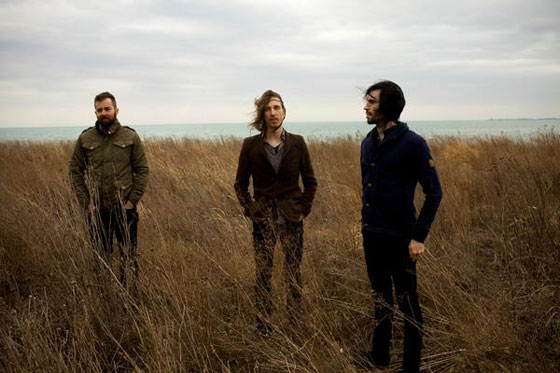
I understand that to a degree. I have a Walrus Audio Slö pedal and it has unique sound that inspires me to play certain things and can’t be replicated on other pedals.
That’s the weird thing in the whole gear fetish community. A lot of times it’s like people are choosing their gear because so-and-so plays it, for example somebody might want to completely replicate Matt Pikes guitar rig and that’s cool if you want to be like Matt Pike… good luck [laughs]. Or people want to take certain sounds. For example, I like Matt Pike’s low end, but I also like Steve Albini’s piercing high-end. Maybe if I play through Matamps, as that’s Albini uses, or Green Amps that Matt Pike plays, then I’ll have a sound similar to both.
That’s not true though, what you’ll end up with is a completely unique sound, which is actually potentially really cool as long as you’re committed to figuring out what the combination does best and embracing it. I don’t think it can be understated enough, to a certain degree, the equipment will dictate what you play. It doesn’t really matter what equipment you have, there’s always something that you can wrangle out of it that sounds cool and interesting. You just have to be open and in tune with it.
I have a Darkglass Alpha Omega Ultra, which is sort of the same circuit that their amp has, but it’s in a stomp box with a graphic band Q…
That’s an interesting and great outlook. I have the tendency to want to sell my stuff and buy new gear after every interview [laughs]. Going with this idea, do you have a particular pedal or sound, such as distortion or reverb, that sparks inspiration?
I’d say it varies. A lot of my adult life I usually pick up an acoustic guitar because I live in a city in apartments, and I don’t necessarily have the benefit of having all my shit in the apartment. I also don’t have neighbors that are hip to loud rock music, so acoustic guitar is what I default to. I bought a house about three years ago so that’s changed a little bit now. I actually have equipment at home and I can turn it up a little bit.
I don’t know if there’s necessarily one thing that I sort of default to in terms of getting an immediately gratifying sound. I actually have this Siberian HM2 Clone that somebody randomly gave me the last time we played Moscow, it’s an HM-2 clone, so you plug it in and it gives you that 90s death metal sound. It’s one of those few distortions I find that even if you’re playing at a quiet volume, it doesn’t sound weird. I don’t really use it in a live setting but at home I get a lot of use out of it. Like you said, it gives you that immediate gratification where you plug it in, you can hear a riff and I mainly use it with my baritone guitar.
With bass, my three primary pedals would be the Fuzzrocious Rat Tail, which now I think is called a Rat King. It’s a RAT clone with a few extra perks to it. I love that pedal and I would say that everyone should have one, but I don’t want everyone to have that tone [laughs]. Then I have a Darkglass Alpha Omega Ultra, which is sort of the same circuit that their amp has, but it’s in a stomp box with a graphic band Q and that’s if you want a super bright metallic sound with some great bass tones. That’s a great pedal for home jamming because even at a low volume it sounds like it’s running through some tubes.
For fuzz, there’s a company called Dwarfcraft Devices out of Eau Claire, Wisconsin that does a really great pedal similar to those Russian Big Muff that are built like a tank. It’s called the Eau Claire Thunder. I really like those but, I don’t think Dwarfcraft is in business anymore unfortunately. I think I have three or four of those in various casings too. That’s just an all-purpose fuzz. Those will be my three or four go too pedals I would say.
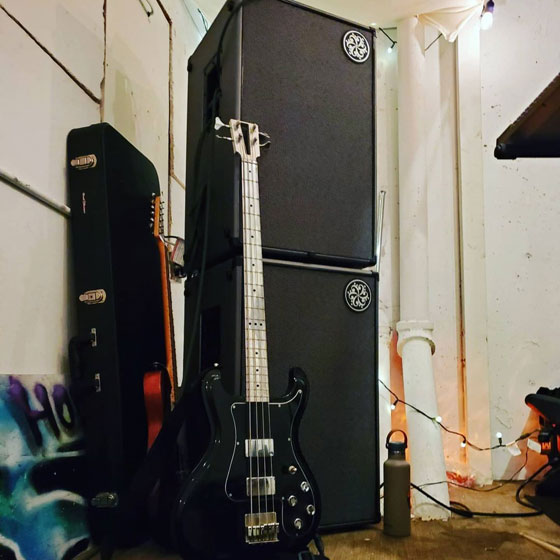
Very cool and I’ll be checking a few of those pedals out especially for bass! Shifting gears a little to songwriting, I spoke with Aaron Turner a few months back and I’m interested in your perspective in songwriting for both SUMAC and Russian Circles and how it varies?
For both bands, it’s a very very different process and I think it has to be that way because otherwise it would be creatively running the risk of stepping on each other’s toes. Russian Circles stuff is meticulously composed and heavily thought out. Russian Circle’s stuff tends to involve a lot of layering, whether that’s me adding loops, or playing the Moog Taurus and the guitar part at the same time, or switching between instruments, there’s not a lot of room for flexibility. When you have to build a loop, then you’re sort of building this thing that’s running on auto pilot. So even if the three humans on stage want to go on a cosmic journey, the loop that we set up is still going to be a metronome indefinitely running. There are areas for little flourishes that allows us to play things slightly different from night to night, depending on how we’re are feeling, but that tends to be more along the lines of fills and runs, not completely expanding or contracting a certain part or coming up with riffs on the fly. That doesn’t happen.
Then with SUMAC and I’m not privy to the conversation you had with Aaron, so I hope I’m not demystifying anything [laughs], but he tends to come to us with a lot of fleshed out guitar ideas. For example, he’ll come to us with the first two minutes of the song and say this is how the guitar will sound and for the next 2-3 minutes, I don’t know we’ll just kind of figure it out [laughs]. Having a structure and writing out songs is great because you’re allowing yourself to shut your brain off and just allow your hands to do what they’re trained to do. With SUMAC it’s very different, you’re very much in the present time and everything is a tight rope walk that could really go either way. If you’re not paying attention, then someone takes it in another direction, you’ll be struggling to keep up, so that’s two very different approaches and they satisfy different lobes of the brain.
Russian Circle’s stuff tends to involve a lot of layering, whether that’s me adding loops, or playing the Moog Taurus and the guitar part at the same time…
To go along with this, how do you create unique riffs?
I don’t know. I guess that just kind of comes with an open mind, having a thirst for trying new things and musical approaches. With Russian Circles, there’s a dynamic that we’ve discussed where you can have like your average stoner rock band and the beauty of that is everything is locked into one riff. So if the guitar player is playing 0 1 0 1 0 1 type riff, then the bass player is going to do the same, making it sound like an extremely massive wall of sound. That’s super effective and awesome, but with Russian Circles, the big part of our philosophy is things will sound heavier if it’s paired with something that’s not heavy.
We try to be a band with dynamics in terms of volume, tone and emotion. Sometimes we’ll have a counter melody or a polyrhythm, like I’ll play 6/8, Mike is playing in 4/4 and it will sync up every other measure, or however it works out. A big part of that band dynamic is trying to figure out where and when to lock in and there’s a difference of opinion on that. I think that’s the beauty of working with others in a collaborative band. I think it’s interesting and there’s a little variation like that.
Ultimately were a band that likes shit like Jesus Lizard. In Jesus Lizard you have a bass player, guitar player and a drummer all occupying their very specific tonal ranges and all doing their own unique thing, but it all comes together, and sounds mean, nasty and fucked up, that’s super cool. I also understand listening to a Sunn O))) album and they’re all playing the same riff that just sounds awesome and bigger than the biggest thing in the world. There’s a way of taking inspiration of both those things and applying it to one song or an album and I think it’s a worthy endeavor.
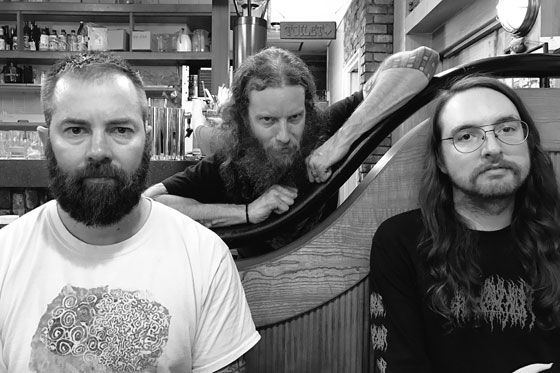
I’ve yet to hear a song I don’t love in Russian Circles or SUMAC so I couldn’t pick one, but do you have a song or part of a song you’re proud of?
I definitely don’t have a default answer to that, but I would say from the riff center of my brain, the bass break in Geneva is satisfying, it’s nothing fancy, nothing difficult but just works really well and I listen to it I think ‘I wish I could do more of those’ [laughs] but songs don’t always call for that sort of thing. From a more nuanced angle, I think the beginning of Mota off of Guidance is something I feel pretty good about because it has a higher end melody on the bass guitar, with the root notes coming through on the Taurus and that’s all working in conjunction with Mike’s arpeggios.
I’m proud of that because we worked on that for a long time, worked with a bunch of options that weren’t working in the bass department and that idea came in at the midnight hour. It’s pretty difficult to pull off live and it’s almost a 50-50 shot whether I’m going to get it, but when I do it’s like ‘all right I did it!’ [laughs]. I mention this a lot in interviews, but in the Rush documentary they talk about Tom Sawyer and they say ‘oh yeah we fuck up that song almost every night. When we don’t fuck it up its super exciting.’ I feel like Mota is my equivalent to that. It’s hard but when you get it, it doesn’t even matter what happens during the rest of the show because we nailed Mota [laughs].
It’s hard but when you get it, it doesn’t even matter what happens during the rest of the show because we nailed Mota…
To continue this a little, you mention struggling with a bass part for Mota. How do you overcome having an off day or something isn’t working right?
I look at it like working out, which I guess comes across kind of jockey, but I do think there’s a parallel between physical exercise and creative exercise, where if you haven’t been playing or working the creative side of your brain you’re not as strong. I know when I go through a period of not being creative, the first time I pick it up it’s not going to yield anything exciting. Taking a break never yields a great comeback immediately. Your hands are never going to be moving as fast as you want, you’re not gonna hear potential in anything that you’re writing and everything’s gonna sound flat and uninspired. I think once you acknowledge that it becomes a lot easier to come back to it the next day.
I feel it’s always good to have a couple of things that are literally just fun warm up exercises. For me, for years I’ve had all these guitar melodies that I was doing my acoustic, or the little Telecaster I have, and if I wasn’t feeling creative, I could at least pick up the guitar, work on those things and feel like I was doing some level of work and improvement. I’m at least exercising my hands and getting some actual muscle memory work. Creatively you have to realize it’s a progression, if you can get anything out of a session, record it, listen to it the next day and see if it tickles some part of a cerebral cortex, if so keep working at it, but ultimately what I found is if you’re at least attempting to be creative every day, after a couple days it gets, not necessarily easier, but you feel more creative.
I feel there’s concrete evidence in that idea through Russian Circles. When we first get together and start writing, the first song usually takes a long time but as we get closer to any deadlines, there will be a last-minute addition that we will practice, a short time later we have a whole song. When you say ‘why did that one take two practices but first song took six months does that mean the new ones not as good?’ I don’t think that’s the case, I think it’s just you have to get the wheels in motion and once it’s rolling then it’s just gonna keep going, it doesn’t require a lot of pushing. It just happens and has its own momentum and inertia and then you just write it.
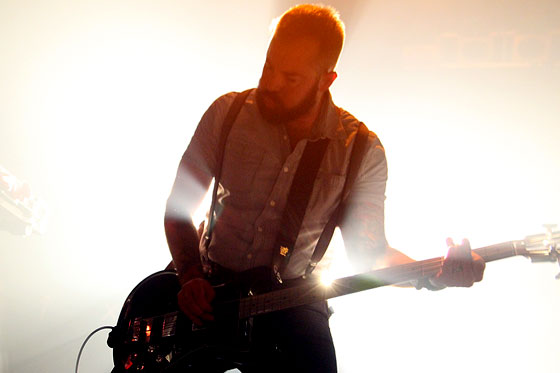
That’s a really awesome outlook and I will try and keep that in the back of my mind. Thank you. What are you listening to for enjoyment these days?
Right now I have the new Darkthrone on the turntable and listened to that earlier. I was listening to Kluster, the original lineup of Kluster. They’re German krautrock band in the late 60s early 70s. I’ve also been listening to Ryo Fukui’s Scenery album from 1976. He’s a Japanese jazz guy. I’ve listened to some early Tomb Mold records, Perilaxe Occlusion’s Exponential Decay album on Blood Harvest in Sweden, that record rules, it’s super brutal, but super dialled in. I’d describe it as caveman death metal. I listen to a lot of death metal, I’m totally on the death metal revival train, which I know might be a fad, but I’m just so stoked that punks are playing death metal and it’s not all these virtuoso dudes that are trying to out shred each other. I’ve always been a fan of punk dudes playing metal versus shredders so I’m pretty stoked on all the new stuff. Even Blood Incantation, that’s progy but still scummy punk dudes hanging out in the basement playing.
I listen to a lot of death metal, I’m totally on the death metal revival train, which I know might be a fad, but I’m just so stoked that punks are playing death metal…
I’ve been listening to that Live In Stuttgart Can record from 1975 that just came out. I’m a big Can fan and that one is pretty exciting because their records are all improv sessions that are cut and pasted into the actual songs, but in the live setting, they’re just weird experimental minimalist jam dudes. That record captures the essence of the band. I’ve been listening to a lot of Joshua Abrams so that’s kind of where my heads been.
About four years ago, I got kind of burnt out on heavy music because at time Russian Circles toured with Mastodon. I think it was just so much heavy metal every night that I want to listen whatever the opposite of that was. Maybe six months after that happened, I wanted to find something in the metal world that was exciting again. For whatever reason it was Darkthrone that was the first band that I latched on to. After that, I couldn’t listen to enough of it. I went through the first six records and that segued into all the other current death metal stuff.
I love to go down the rabbit hole with music.
That seems to be my pattern. Before death metal it was jazz and before that it was all the kraut rock stuff. Can, NEU, Kraftwerk and diving into Popal Voh and Kluster. I tend to find something I’m interested in that I exhaust myself on and then move onto the next thing
We’ll I’ve personally been on a huge Russian Circle kick and don’t see myself getting exhausted anytime soon. I appreciate you doing this interview and it’s been amazing. I’ve been telling everyone I got to interview you and now they all get to read it [laughs].
That’s awesome I’m flattered.
Russian Circles: Official | Facebook | Bandcamp | Twitter | Instagram
SUMAC: Facebook | Bandcamp | Twitter | Instagram
Label: Sargent House | Thrill Jockey Records
Interviewed by: Josh Schneider

